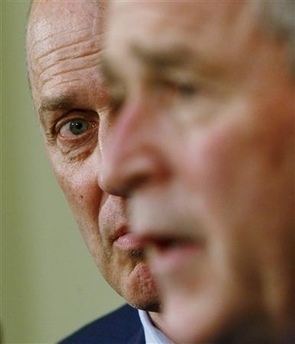White House, lawmakers push for economy plan
Updated: 2008-01-24 09:21
WASHINGTON -- The White House and US lawmakers were pushing on Wednesday to reach a deal on an election-year economic package that President George W. Bush said would be "robust" enough to lift the economy out of the doldrums.
|
|
Negotiations among House Speaker Nancy Pelosi, a California Democrat, House Republican Leader John Boehner of Ohio, and Treasury Secretary Henry Paulson continued into the night in an effort to reach a deal on a $150 billion package that would include tax rebates to workers and other measures aimed at heading off a recession.
On her way into a meeting to discuss a stimulus package, Pelosi told reporters, "We have more work to do. ... It's moving in a forward direction."
"There is no agreement," she added.
Bush expressed optimism he would strike a deal with the Democratic-led Congress even as some of his fellow Republicans began to express reservations about the proposed package and its impact on budget deficits.
"I am concerned that, in our rush to 'help,' we talk ourselves into a quick, feel-good hit today that will leave us with a bigger budgetary hangover tomorrow," said Rep. Paul Ryan of Wisconsin, senior Republican on the House Budget Committee.
Sen. Jon Kyl, Arizona Republican, also said he had concerns about the package.
"I am very skeptical of cash payments, the way that some of the ideas have been floated, having the kind of impact we would like it to have," Kyl said. "There are folks in this country that are hurting and you want to make sure you do the best you can. Sometimes the notion that you can do something really quickly is contrary to good judgment."
The Congressional Budget Office estimated on Wednesday that the US budget deficit would grow to at least $219 billion this year, up from $163 billion in 2007. When upcoming Iraq war costs are included, the fiscal 2008 deficit will be closer to $250 billion, CBO Director Peter Orszag told Congress.
TAX REBATES, REDUCTIONS
Fears of a US recession prompted a worldwide sell-off in financial markets this week but a day after the Federal Reserve rushed to cut interest rates by three-quarters of a percentage point, the stock market reversed some if its losses.
The Dow Jones industrial average rose by nearly 300 points on Wednesday or about 2.5 percent following a topsy-turvy day on Tuesday in which it fell more than 100 points.
Bush told a group of mayors at the White House he was optimistic about reaching agreement with Congress.
"I talked to them about my desire to work with the Congress to get a stimulus package passed, one that's going to be robust enough to affect the economy, simple enough for people to understand it and efficient enough to have an impact," Bush told reporters.
Under discussion between the White House and Congress are tax rebates of up to $800 for individuals and $1,600 for families. The proposal would also allow businesses to take faster tax deductions for investments in new equipment.
The two sides are also discussing changes to the Federal Housing Administration that would make it easier for troubled homeowners to refinance their loans, raising the loan caps for Fannie Mae and Freddie Mac, which buy loans from lenders and repackage them into securities for investors.
Democrats are pushing to ensure some of the package reaches low-income and poor people. They would like to extend unemployment insurance benefits and provide extra money for food stamps, a government program to help low-income people purchase food.
Paulson has hinted the White House might be open to distributing the rebate checks more broadly.
|
|
|
||
|
||
|
|
|
|


